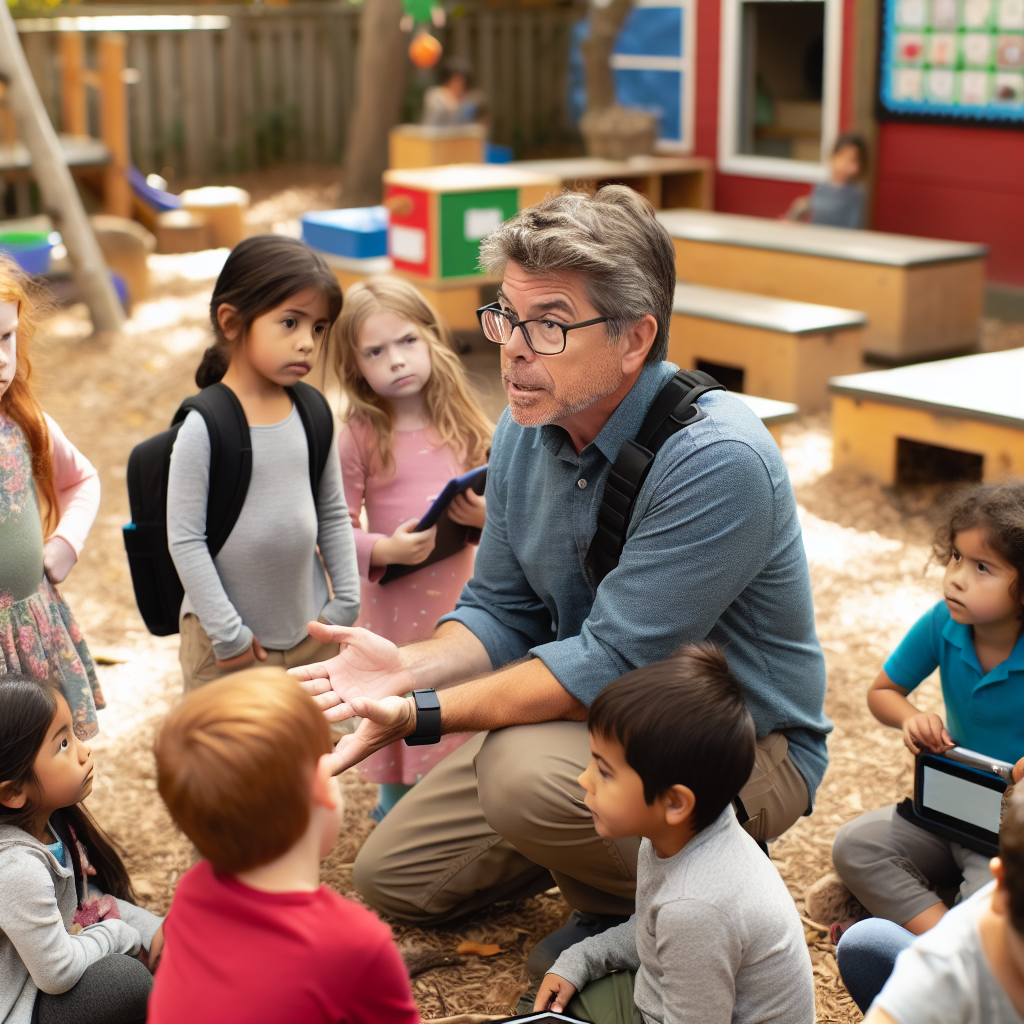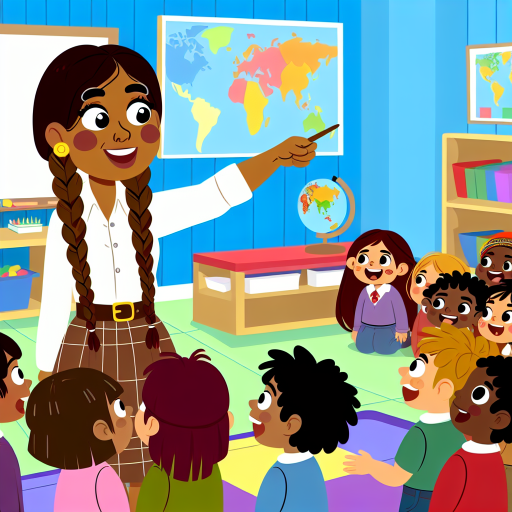Introduction to the Evolving Landscape of Early Childhood Education
The field of early childhood education is undergoing significant transformation.
Emerging technologies are reshaping how educators engage with young learners.
Furthermore, these innovations enhance teaching methods and learning experiences.
Today, educators utilize digital tools to create interactive environments.
This shift encourages active participation from children during lessons.
Moreover, technology helps teachers access a wealth of resources.
For instance, educational apps and online platforms offer diverse materials.
Likewise, virtual classrooms provide flexible learning opportunities.
As a result, early childhood educators must adapt to these changes.
They are now becoming tech-savvy professionals.
In addition, training programs for teachers increasingly focus on technology integration.
Overall, the role of early childhood educators is expanding.
They are not only instructors but also facilitators of digital literacy.
Consequently, they play a crucial role in preparing children for a tech-driven world.
Technology is transforming early childhood education in remarkable ways.
It challenges educators to rethink traditional practices and embrace innovation.
The Impact of Technology on Teaching Methods in Early Childhood Education
Integration of Digital Tools
Technology enhances the learning experience for young children.
Educators now utilize tablets and interactive whiteboards in classrooms.
These tools make learning more engaging and interactive.
Moreover, they cater to various learning styles among children.
Personalized Learning Experiences
Technology allows for tailored educational content.
Children can learn at their own pace through educational software.
This individualized approach helps meet diverse needs effectively.
As a result, educators can better support each child’s development.
Improving Communication with Families
Technology fosters stronger connections between educators and families.
Unlock Your Career Potential
Visualize a clear path to success with our tailored Career Consulting service. Personalized insights in just 1-3 days.
Get StartedDigital platforms facilitate easier sharing of progress updates.
Furthermore, they encourage active parental involvement in learning.
For instance, many preschools use apps to communicate important information.
Access to a Wider Range of Resources
Technology expands access to educational resources and materials.
Teachers can find creative lesson plans and activities online.
Additionally, children can explore virtual field trips from the classroom.
This access enhances their understanding of various topics.
Professional Development for Educators
Technology offers abundant professional development opportunities.
Educators can participate in online courses and webinars.
These resources help them stay up-to-date with the latest educational trends.
Consequently, teachers can implement effective strategies in their classrooms.
How Digital Tools Enhance Engagement and Learning Outcomes for Young Children
Interactive Learning Environments
Digital tools create interactive learning environments for young children.
These environments encourage exploration and active participation.
For instance, touchscreen devices engage children’s motor skills effectively.
Moreover, interactive apps promote collaboration among peers.
Personalized Learning Experiences
Technology enables personalized learning experiences tailored to individual needs.
Adaptive learning software adjusts content based on children’s progress.
This approach enhances motivation and engagement significantly.
As a result, educators can focus on each child’s unique learning path.
Enhancing Communication Skills
Digital tools foster improvements in children’s communication skills.
Multimedia resources encourage storytelling and expression of ideas.
Children can create videos, audio recordings, and digital art projects.
These activities allow for richer language and vocabulary development.
Facilitating Early Literacy Skills
Technology plays a crucial role in developing early literacy skills.
Interactive e-books make reading engaging and enjoyable for children.
Additionally, educational games reinforce phonemic awareness and comprehension.
Such resources motivate children to practice reading independently.
Assessment and Feedback
Digital tools provide immediate assessment and feedback for educators.
Data analytics help track students’ progress in real-time.
This insight allows for timely interventions when necessary.
Teachers can adjust instructional strategies based on individual performance.
Building Digital Literacy
Integrating technology in education builds essential digital literacy skills.
Children learn how to navigate various digital platforms safely.
This knowledge is critical for their future academic and professional success.
Furthermore, understanding online etiquette promotes responsible digital citizenship.
You Might Also Like: Exploring Workplace Settings for Early Childhood Educators
The Role of Educational Apps and Online Resources for Preschool Educators
Enhancing Learning Experiences
Educational apps provide interactive ways for children to learn.
They engage young learners with colorful graphics and sounds.
Furthermore, these apps cater to various learning styles.
Online resources offer diverse activities and games to supplement lessons.
Supporting Educators’ Planning
Online platforms provide lesson plans and resource sharing.
Educators can access templates and materials tailored for preschoolers.
This flexibility allows teachers to customize lessons easily.
Moreover, many platforms foster collaboration among educators.
Facilitating Communication with Parents
Apps enhance communication between teachers and parents.
They provide updates on children’s progress and daily activities.
Through these tools, families can engage more actively in learning.
Additionally, digital platforms allow for sharing educational resources.
Building Digital Literacy Skills
Children develop essential digital literacy skills through apps.
They learn to navigate technology in a safe environment.
This early exposure prepares them for future educational needs.
Moreover, fostering digital skills complements their traditional learning.
Encouraging Creativity and Critical Thinking
Many educational apps promote creative expression and critical thinking.
Children can explore music, art, and storytelling through interactive tools.
Simultaneously, these activities encourage problem-solving skills.
Thus, technology nurtures their creativity and cognitive development.
Gain More Insights: Daycare vs. Preschool Roles for Early Childhood Educators
Training and Professional Development Opportunities for Educators in Tech Integration
Importance of Continuous Learning
Continuous learning is essential in today’s educational landscape.
Early childhood educators must adapt to new technologies.
This adaptation improves teaching methods and child engagement.
Moreover, it enhances educators’ professional mastery of instructional tools.
Workshops on Digital Tools
Many organizations offer specialized workshops on digital tools.
These workshops focus on practical applications of technology.
For instance, educators learn to integrate smartboards in classrooms.
They also explore educational apps suitable for young learners.
Furthermore, these sessions foster collaboration among educators.
Online Courses and Certifications
Online professional development courses have gained popularity.
These courses allow flexibility in scheduling for busy educators.
Many institutions offer certifications in tech integration.
These recognized credentials can enhance an educator’s career prospects.
Additionally, they showcase commitment to professional growth.
Peer Mentorship Programs
Peer mentorship programs are another valuable resource.
They connect novice educators with experienced peers in technology use.
Through mentorship, educators can share insights and strategies.
This collaboration promotes a culture of continuous improvement.
Ultimately, it leads to richer learning experiences for students.
Networking Opportunities
Networking with tech-savvy educators is beneficial for all professionals.
Conferences and seminars provide platforms for sharing best practices.
Such events often feature guest speakers who are industry experts.
This exposure to innovative ideas can inspire educators.
Moreover, it expands their understanding of emerging technologies.
Access to Resources and Support
Educators need ongoing access to resources and support.
Many districts now provide technology resource centers.
These centers offer tools and guidance for effective tech integration.
Additionally, online forums connect educators globally for support.
Collaboration across regions enhances resource sharing.
Uncover the Details: Best Practices for Early Childhood Educator Professional Growth

Challenges and Barriers Faced by Early Childhood Educators When Adopting New Technologies
Understanding the Resistance to Change
Many educators experience resistance when integrating new technologies into their classrooms.
This resistance often stems from a lack of confidence in technology use.
Additionally, educators may feel overwhelmed by the rapid pace of technological advancements.
Furthermore, some educators prefer traditional teaching methods that they believe are more effective.
Limited Access to Resources
Access to technology varies greatly among educational institutions.
Some facilities lack the necessary hardware and software for effective integration.
Moreover, financial constraints hinder many schools from investing in new technologies.
Consequently, educators often feel ill-equipped to implement technology in their teaching.
Lack of Training and Professional Development
Professional development opportunities related to new technologies are often limited.
Many educators do not receive adequate training to use new tools effectively.
As a result, they are less likely to embrace technology in their teaching practices.
Additionally, ongoing support is crucial for educators to feel comfortable with new systems.
Concerns About Child Development
Some educators worry that technology may negatively impact young children’s development.
They fear that excessive screen time can hinder social skills and creativity.
Moreover, educators might be concerned about children’s dependency on technology.
Thus, balancing technology use with traditional learning methods remains a challenge.
Parent and Community Expectations
Parents often have specific expectations regarding early childhood education.
Some may favor traditional teaching methods over technology-rich approaches.
These differing viewpoints can create tension between educators and parents.
As a result, educators may hesitate to adopt new technologies to avoid parental backlash.
Addressing Barriers for Successful Implementation
To successfully integrate technology, educators need better access to resources.
Training programs should focus on building confidence in using new tools.
Moreover, schools can foster a supportive environment for exploring technology.
Ultimately, understanding community expectations is essential for navigating changes.
See Related Content: Careers in Special Education: How Canada Supports Diverse Learning Needs
Balancing Screen Time and Traditional Teaching Methods in Early Childhood Settings
Understanding the Role of Technology
Technology plays a vital role in modern education.
In early childhood settings, it enhances learning experiences.
However, it is essential to maintain a balance.
Defining Appropriate Screen Time
Experts recommend limited screen time for young children.
Guidelines suggest no more than one hour per day for ages 2 to 5.
Quality content should be prioritized over quantity.
Parents and educators should select age-appropriate programs.
Integrating Traditional Teaching Methods
While technology is valuable, traditional methods remain crucial.
Hands-on activities promote creativity and social skills.
Learning through play enhances cognitive development.
Traditional storytelling fosters language and communication skills.
Creating a Balanced Curriculum
A balanced curriculum incorporates both technology and traditional methods.
Activities can include digital storytelling alongside tactile experiences.
Outdoor play can complement educational apps and games.
Interactive sessions can engage children and deepen learning.
Training Early Childhood Educators
Educators must be trained in both technology and traditional methods.
Professional development programs can enhance their skills.
Workshops should focus on integrating technology effectively.
Continued support helps educators adapt to changing needs.
Engaging Families in the Process
Collaboration with families is essential for balance.
Educators should inform parents about technology usage.
Workshops can guide families in selecting quality content.
Open communication builds trust and encourages involvement.
Future Trends in Technology Influencing Early Childhood Educators
Increased Use of Artificial Intelligence
Artificial intelligence is becoming a significant tool in early childhood education.
Teachers will utilize AI for personalized learning experiences.
This technology adapts to each child’s learning style and pace.
Moreover, it can assist educators in tracking developmental milestones.
Integration of Augmented and Virtual Reality
Augmented and virtual reality will transform classroom environments.
These technologies create immersive learning experiences for young children.
Educators will use VR to simulate real-world scenarios.
This enhances engagement and encourages exploration among students.
Expansion of Online Resources and Remote Learning
Online resources are increasingly available for early childhood educators.
Webinars and virtual workshops will facilitate professional development.
Additionally, remote learning technologies will enhance teaching methods.
Teachers will be able to connect with children from various locations.
Consequently, this promotes diverse learning opportunities.
Enhanced Collaboration Through Technology
Technology will improve collaboration between educators and parents.
Communication platforms will enable regular updates on child progress.
Furthermore, this fosters a supportive learning community.
Teachers can easily share resources and strategies with each other.
Utilization of Data Analytics for Improved Outcomes
Data analytics is set to play a vital role in early childhood education.
Teachers will analyze children’s learning patterns and outcomes.
This will help in creating tailored interventions for students.
Additionally, informed decisions will enhance curriculum effectiveness.
Prevalence of Mobile Learning Tools
Mobile learning tools are becoming integral to education.
Educators will leverage apps for interactive and engaging learning experiences.
These tools provide flexible learning opportunities for children.
Thus, teachers can create a dynamic learning environment.
Focus on Digital Literacy
Digital literacy will be a critical skill for educators to teach.
Understanding technology will empower children for future learning.
Teachers will guide students in using technology responsibly and effectively.
This includes developing critical thinking and problem-solving skills.
Implications for Early Childhood Education
Technology will significantly influence the role of early childhood educators.
As these trends emerge, teachers will adapt their practices accordingly.
Consequently, they will better support children’s learning and development.
Additional Resources
Best Practices in Equity, Diversity and Inclusion in Research
Writing a Teaching Philosophy Statement – Centre for Teaching and …




